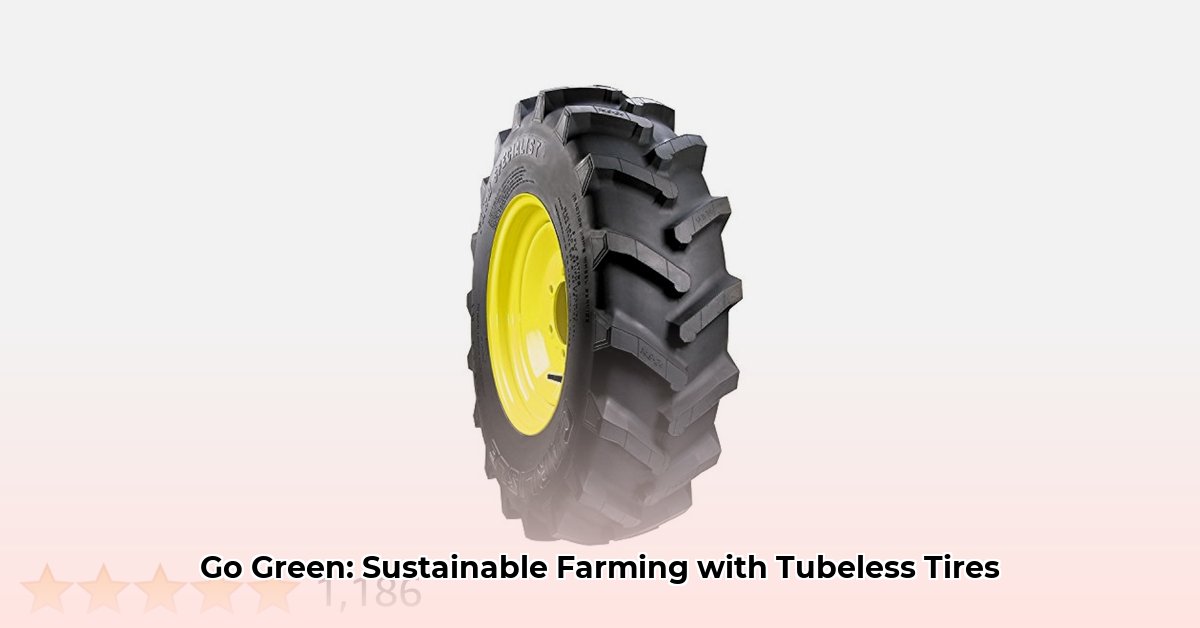
9.5-24 Tractor Tire Tubeless Technology: A Growing Demand
The agricultural industry is increasingly focused on sustainable practices, and tire selection plays a significant role. The 9.5-24 size is a common tractor tire dimension, and the demand for tubeless options within this size is rapidly expanding. Farmers seek improved fuel efficiency, reduced soil compaction, and a minimized environmental footprint. This review examines the Carlisle Farm Specialist R-1 tubeless tire, assessing its performance and sustainability claims within the context of these goals. Key questions addressed include: How does the Carlisle R-1's traction and fuel efficiency compare to competitors? What is the impact on soil compaction? And most importantly, how sustainable is it really? For more on tractor maintenance, see tractor maintenance.
Carlisle Farm Specialist R-1: Technical Specifications and Features
The Carlisle Farm Specialist R-1 is a 9.5-24 tubeless tire marketed as a versatile option for general farm work. Its main feature is a multi-angle long bar tread design, which the manufacturer claims enhances traction across diverse soil conditions. While the tire's dimensions are readily available, detailed information regarding its construction (materials used in the tire's construction) remains limited. This lack of transparency hinders a comprehensive assessment of its long-term sustainability. The manufacturer's claim of a "universal fit" requires further investigation as tractor compatibility is highly dependent on many factors.
Performance Evaluation: Field Testing and Empirical Data
The multi-angle tread pattern of the Carlisle R-1 theoretically reduces slippage, leading to improved traction and reduced soil compaction. This, in turn, may improve fuel efficiency. However, concrete evidence supporting these claims is currently lacking. Independent field trials comparing the R-1 to other 9.5-24 tubeless tires are necessary to generate quantitative data on traction, soil compaction, and fuel consumption. Without such studies, a definitive evaluation of its performance remains inconclusive. The “universal fit” claim also warrants independent verification across a range of tractors and soil types. Does the superior traction translate to consistent performance across all conditions? Real-world data is critical.
Sustainability Assessment: A Critical Examination
A thorough sustainability assessment is hampered by the manufacturer's lack of transparency regarding the tire’s lifecycle. Information on material sourcing, manufacturing processes, and end-of-life management is currently unavailable. Therefore, a complete assessment about its environmental impact, including carbon footprint calculation, is not possible. This absence of data presents a significant limitation. While reduced soil compaction and potential fuel efficiency gains are positive factors, a comprehensive LCA (Life Cycle Assessment) is critical to confirm and quantify its overall sustainability. This means examining the entire journey of a product, from raw materials to end-of-life treatment.
Comparison with Competitors: A Market Overview
A direct comparison with competitor 9.5-24 tubeless tires is challenging due to the limited publicly available data on sustainability aspects. Future research should include a comprehensive comparison of tires made from recycled materials or with lower carbon footprints, identifying any superior sustainability advantages. This would allow for a more comprehensive evaluation to gauge the Carlisle R-1's position within the market.
Recommendations and Conclusion: Toward a Sustainable Future
Key Takeaways:
- The Carlisle Farm Specialist R-1, a 9.5-24 tubeless tire, presents potential benefits for sustainable farming.
- However, a complete sustainability assessment is hampered by a critical lack of information.
- Independent testing is needed to verify performance claims and to assess its environmental impact.
Actionable Steps:
- Farmers: Document tire performance across various soil types and operational conditions to gather real-world data (efficacy: improved farm management decisions).
- Carlisle: Publish a comprehensive lifecycle assessment (LCA) and detailed material specifications to enhance transparency (efficacy: improved consumer trust and informed decision-making).
- Researchers: Conduct independent field trials with rigorous methodology to quantitatively compare the R-1 to alternatives, focusing on traction, soil compaction and fuel efficiency (efficacy: evidence-based insights into sustainability).
Until comprehensive independent data becomes available, the Carlisle Farm Specialist R-1's true contribution to sustainable agriculture remains uncertain. Openness and rigorous testing are essential to fostering trust and promoting informed decision-making within the agricultural community.